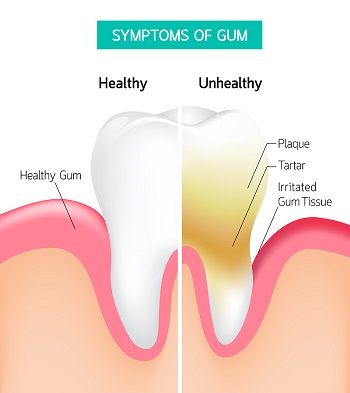 Dental plaque is a much more serious issue than many people believe, says Dr. Jones of Nashville Restorative Dentistry. And more than being a dental problem, an excess of this sticky film can lead to gum disease, which comes with a host of potential side effects, including an elevated risk of diabetes, cancer, and preterm birth. Keep reading as the Nashville area dentist answers a few questions about plaque and periodontal disease.
Dental plaque is a much more serious issue than many people believe, says Dr. Jones of Nashville Restorative Dentistry. And more than being a dental problem, an excess of this sticky film can lead to gum disease, which comes with a host of potential side effects, including an elevated risk of diabetes, cancer, and preterm birth. Keep reading as the Nashville area dentist answers a few questions about plaque and periodontal disease.
Q: What is plaque?
Nashville Restorative Dentistry, Dr. Jones: Plaque is a layer of sticky film left on the teeth after consuming certain types of food. Sugars and starches especially can coat the teeth in plaque, which contains a range of unhealthy bacteria. Tooth discoloration is an early sign of plaque buildup, and teeth with a yellow cast may be showing the first signs of poor oral hygiene.
Q: How does poor oral hygiene contribute to plaque buildup?
Nashville Restorative Dentistry, Dr. Jones: When you eat or drink, bits of that which you consume stick to your teeth, much like dust on a hard surface. These leftover deposits contain bacteria that, when not regularly removed, can leave your gums inflamed, sore, and bleeding. The longer you wait to clean the surface of your teeth, the more plaque builds up, and the more likely you are to suffer with cavities and to develop gum disease, which comes in three stages.
Q: What are the three stages of gum disease?
Nashville Restorative Dentistry, Dr. Jones: Gingivitis, periodontitis, and advanced periodontitis are the stages of gum disease, and they are progressive and very distinct from one another. Gingivitis is a reversible condition. It’s typified by inflammation around the gum line and often presents with pain and bleeding when brushing while brushing or biting into hard foods. Left untreated gingivitis progresses to periodontitis, the second stage of gum disease. At this time, the damage is irreversible, but oral hygiene improvements and treatment can prevent additional damage. Advanced periodontitis is significant in that the bone and gum tissue are destroyed beyond repair. Loose and missing teeth affect a person’s ability to perform simple tasks, such as drinking and eating.
Q: How is gum disease treated?
Nashville Restorative Dentistry, Dr. Jones: Treatment is different depending upon which stage the disease has progressed. Initial treatment may include ultrasonic instrumentation, which removes bacterial biofilm and breaks down tartar buildup. Advanced gum disease will require more invasive techniques including tissue or bone grafting and surgical pocket reduction.
Q: Is it possible to prevent plaque build up from advancing to gingivitis?
Nashville Restorative Dentistry, Dr. Jones: For the vast majority of individuals, it is entirely possible. Protecting the teeth and gums begins and ends with oral care. We recommend using Carifree toothpaste and a soft-bristled Sonicare toothbrush combined with mouthwash each day. Closys and Brushing Rinse are excellent for helping to prevent plaque and keep the mouth healthy. But more than daily brushing and flossing, a healthy oral care routine should also include flossing, limiting sugar intake, and establishing a twice-yearly dental check-up schedule and cleaning. It’s important to note, however, that everyone experiences plaque at some point. Timely removal, in the form of proper oral care, makes the difference between it being a minor annoyance and becoming a long-term and significant health issue.
Nashville Restorative Dentistry serves Franklin and the surrounding communities and offers a range of procedures including cosmetic dentistry, oral surgery, and sedation dentistry. A Fellow of the American Academy of General Dentistry, Dr. Jones is one of the area’s foremost experts in restorative and biological dentistry. Visit nashvillerestorativedentistry.com for more information.